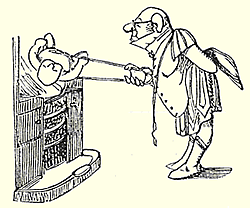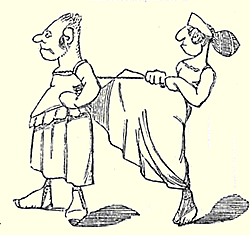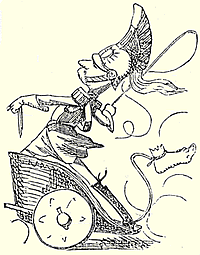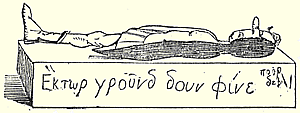 |
Fun , November 5, 1864 |
||||||
[NOTE BY THE EDITOR. — The Comic Physiognomist has at length fallen a victim to his enormous labours. He has, as he himself expressed it to us (through the medium of the DAVENPORT BROTHERS), physiognomied himself into another and a worse world. How this frightful consummation was brought about we are not informed; we must be content to accept the fact as we find it. At the same time every information will be cheerfully given to scientific gentlemen who may be desirous of investigating this unprecedented cause of death. The Editor has a melancholy pleasure in stating that he has secured the services of a gentleman before whose intellectual radiance the less remarkable and much more ineffectual fires of the C. P. must necessarily pale. On the whole the Editor rather congratulates the readers of Fun on the C. P.'s premature end, for he was becoming a nuisance, and was growing unpleasantly cocky on the strength of his certainly enormous popularity.]
![]()
The Comic Mythologist regrets extremely that these papers must, from their nature, afford both instruction and amusement. Personally he has the greatest possible objection to anything that savours of the educational. His own education was grossly neglected in his early youth, and he hereby expresses his thanks to those beneficent parents who kindly allowed him to grow up his own way. At the moment of his penning these lines he knows nothing whatever about mythology. He is accustomed to swear by one JOVE when annoyed, he has seen some classical burlesques, and he has purchased a second-hand "Lempriere", for seven-and-threepence. This is the classical foundation upon which he intends to build for himself an undying reputation as a Comic Mythologist. The C. M. undertakes, hereby, to make these papers as uninstructive as possible, and he confidently assures his readers that they will not derive the smallest amount of genuine information from them if he can possibly help it.
![]()
Was the son of PELEUS and THETIS, who was a sea-deity (see "THETIS", when we get to it). THETIS gave herself out as immortal (which was absurd, or where is she now?), and was so extremely indignant at finding herself the mother of seven mortal sons, that she threw them all, one after the other as they were born, into the kitchen fire — a course of procedure which, if it had been indulged in at a later period, would certainly have resulted in her own immortality being placed to an extremely severe trial at the Old Bailey.
 PELEUS, who appears to have been a monarch of a singularly easy frame of mind, stood this sort of thing for several years. At length it seems suddenly to have occurred to him that the analogy that THETIS appeared to draw between his sons and a litter of puppies was not particularly complimentary to himself as their father, while it was particularly uncomplimentary to THETIS as their mother, so he took upon himself the responsibility of rescuing the seventh from his sensation situation. It appears that an authority possessing the familiar name of TZETZES assigns to THETIS a different motive in the case of ACHILLES. T. says that with the view of conferring immortality on the young man, she anointed him with ambrosia during the day, and put him into the fire at night. The C. M. does not know what ambrosia was, but conceives that it might have been a species of pomatum. That immortality might have been brought about by such a receipt is undoubted, but it must have been of a posthumous description. Other writers say that she dipped him into the Styx (on the principle, the C. M. supposes of "Spare the rod, spoil the child"), and so rendered invulnerable every part of the body except that by which she held him, and which was, on that account, ironically called the "heal".
PELEUS, who appears to have been a monarch of a singularly easy frame of mind, stood this sort of thing for several years. At length it seems suddenly to have occurred to him that the analogy that THETIS appeared to draw between his sons and a litter of puppies was not particularly complimentary to himself as their father, while it was particularly uncomplimentary to THETIS as their mother, so he took upon himself the responsibility of rescuing the seventh from his sensation situation. It appears that an authority possessing the familiar name of TZETZES assigns to THETIS a different motive in the case of ACHILLES. T. says that with the view of conferring immortality on the young man, she anointed him with ambrosia during the day, and put him into the fire at night. The C. M. does not know what ambrosia was, but conceives that it might have been a species of pomatum. That immortality might have been brought about by such a receipt is undoubted, but it must have been of a posthumous description. Other writers say that she dipped him into the Styx (on the principle, the C. M. supposes of "Spare the rod, spoil the child"), and so rendered invulnerable every part of the body except that by which she held him, and which was, on that account, ironically called the "heal".
 His careful mamma, with the object of preventing him from going to the Trojan war, dressed him up as a woman, and here we have him undergoing the operation. As he is looked upon as one of the foremost heroes of antiquity, the C. M. supposes it was all right, but he fears that a modern hero who took the same steps would find some difficulty in convincing a court-martial of his heroic qualities.
His careful mamma, with the object of preventing him from going to the Trojan war, dressed him up as a woman, and here we have him undergoing the operation. As he is looked upon as one of the foremost heroes of antiquity, the C. M. supposes it was all right, but he fears that a modern hero who took the same steps would find some difficulty in convincing a court-martial of his heroic qualities.
As Troy could not be taken without the aid of ULYSSES, and as the army before that city were getting tired of the extremely long Troy wait which elapsed between each of the hacks, they sent ULYSSES, in the assumed character of a pedlar, to the court of LYCOMEDES, in which ACHILLES was then staying. ULYSSES exposed jewels, ribbons, and arms for sale to ACHILLES, and as ACHILLES (although dressed as a woman) took to his (ULYSSES) arms,  whereas a woman would at the sight of them take to her (the woman's) legs, his sex was discovered. The murder being out, he accompanied his companions to the war, where (being invulnerable) he performed prodigies of valour. However, he appears to have snatched at every excuse for shirking military duty, and the abduction of his mistress, BRISEIS, by AGAMEMNON, afforded him urgent private grounds for leaving the seat of war. The death of PATROCLUS, however (of whom the C. M. knows nothing at all yet), woke him up, and induced him to slay HECTOR, and drag him three times round the walls of Troy. The engraving in the margin shows the condition to which HECTOR was reduced after the "third round". It cannot be said that he came up smiling. The tears of the aged PRIAM at length induced the cowardly ruffian ACHILLES to yield up the body, which was ground down to the condition shown in the engraving.
whereas a woman would at the sight of them take to her (the woman's) legs, his sex was discovered. The murder being out, he accompanied his companions to the war, where (being invulnerable) he performed prodigies of valour. However, he appears to have snatched at every excuse for shirking military duty, and the abduction of his mistress, BRISEIS, by AGAMEMNON, afforded him urgent private grounds for leaving the seat of war. The death of PATROCLUS, however (of whom the C. M. knows nothing at all yet), woke him up, and induced him to slay HECTOR, and drag him three times round the walls of Troy. The engraving in the margin shows the condition to which HECTOR was reduced after the "third round". It cannot be said that he came up smiling. The tears of the aged PRIAM at length induced the cowardly ruffian ACHILLES to yield up the body, which was ground down to the condition shown in the engraving. He afterwards fell in love with HECTOR's sister, POLYXENA, and he was properly murdered by PARIS, who shot him in the heel just as he was in the agonies of proposing to her in the temple of Minerva.
He afterwards fell in love with HECTOR's sister, POLYXENA, and he was properly murdered by PARIS, who shot him in the heel just as he was in the agonies of proposing to her in the temple of Minerva.
It is difficult to imagine a more utterly contemptible character than that of the Greek hero ACHILLES. A more utter cur never disgraced an army, and as he was practically invulnerable, his conduct was simply incomprehensible. We turn with pleasure from this disagreeable subject, to the next article in this number, which is called
![]()
We are happy in being able to state that the MARQUIS OF WESTMEATH, who lately failed to prove his charge against the organ-grinder and was sharply snubbed by Mr. YARDLEY for questioning his decision, has received the following bit of sympathy from his native land. The Marquis forwarded it to us immediately on receipt, with an earnest request that we would lose no time in the insertion:—
| "Thunder an' bother! Ye son o' your mother, |
|
| Jist hear me whisper the laste; | |
| The divil take YARDLEY, He trated ye hardly — |
|
| Shure, now, I call him a baste." | |
Page modified 28 July 2011